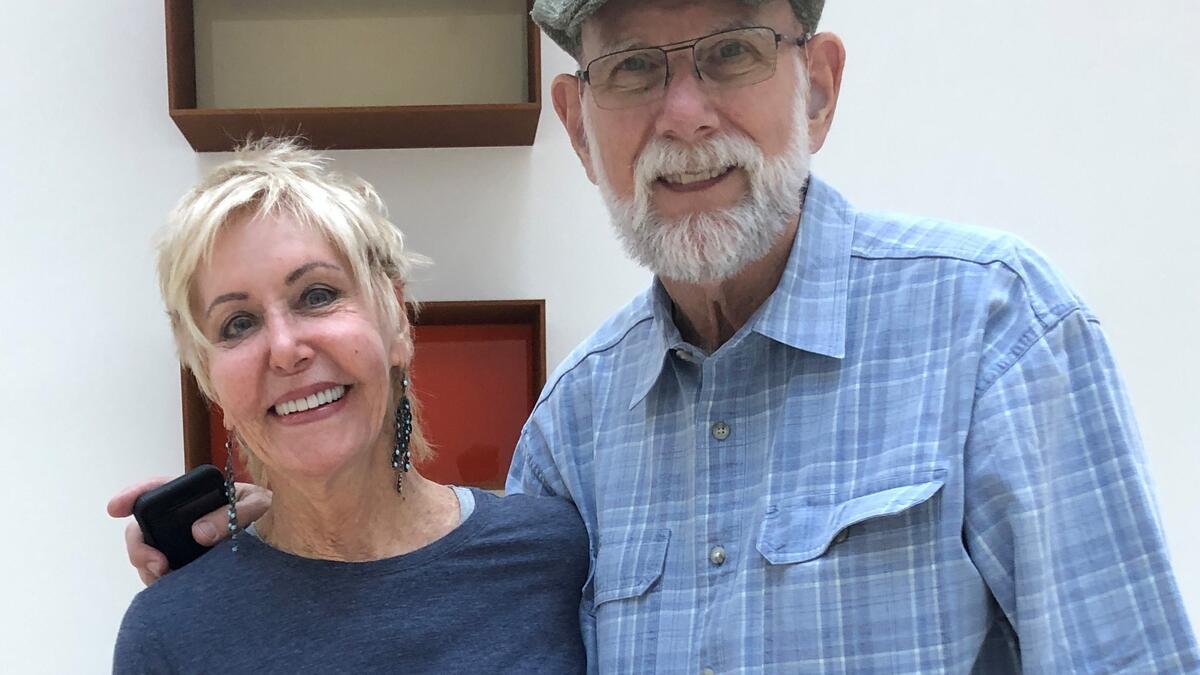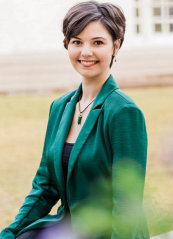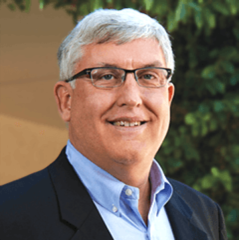OLLI at ASU helps hundreds of active adults keep learning, connecting during pandemic

Nancy and Ted Wolter of Gilbert are lifelong learners at OLLI at ASU. They've found taking classes online while the COVID-19 pandemic has kept them at home to provide comfort, knowledge, engagement and continued connections with fellow learners.
Retirees Nancy and Ted Wolter were already big fans of the wide variety of learning and engagement opportunities within the Osher Lifelong Learning Institute (OLLI) at Arizona State University. Then the COVID-19 pandemic struck, and OLLI at ASU offered knowledge and comfort as the Wolters remained at home.
OLLI at ASU, or Osher as it’s sometimes called, offers noncredit, university-quality learning experiences for adults age 50 and older through diverse classes, engagement with the university and public service initiatives. The 2,500 members — and growing — have fun sharing wisdom, acquiring new knowledge and making friends.
Both Nancy and Ted had long careers in the arts — she at a Valley arts center and he at a college — and they loved continuing to learn by choosing from OLLI at ASU’s extensive class list and engagement beyond the classroom.
Then, when OLLI at ASU recently did what the rest of the university did — transform its in-person courses to online ones in response to the COVID-19 pandemic, with no break in engagement — the couple had reasons to be particularly grateful.
Ted took ill upon the couple’s return home to Gilbert from a spring break trip to New York City March 15, forcing them to stay inside.
Lockdowns were not in place when they left on their trip, and Broadway theaters were still open.
“There was no effort to keep people informed. We thought, if we washed our hands and wiped everything, we’d be safe,” said Nancy, a former development director at Mesa Arts Center. Weeks later, Ted’s test results showed he had contracted COVID-19. He convalesced at home, where both quarantined themselves. Nancy also tested positive several days later, saying her mild case gave her a runny nose and cough.
During this time, Nancy joined her OLLI at ASU friends in classes and in her role on its development committee. She said OLLI at ASU was there for her while staying home in ways it couldn’t have been before, as she found her role as a caretaker, home and scared, more manageable because of her connections to those she cared about within Osher.
Today, Nancy says her husband is well enough to rake leaves in their yard, and she is reorganizing shelves. “Just good old quarantine stuff,” she said.
Now, lifelong learning means something even more special to Nancy and Ted, as the preciousness of life has become so apparent. The couple appreciates how OLLI at ASU, along with the community of learners it has fostered over the years, has made a huge difference in their quality of life.
Nancy said since 2017 she has taken 25 in-person classes, learning about topics ranging from Einstein’s mathematical theories to how to pay attention to the needs of others.
For a membership fee of $20 in fall and spring, and $10 in summer, she and Ted have had opportunities to take classes, participate in committees, form interest groups, become involved in the community and more.
Battling isolation is good mental health
Richard Knopf, director of OLLI at ASU, said that the creation of online platforms not only keeps adults ages 50 and older learning during this time of mandatory social distancing, but has also become a means for members to connect with each other in new and exciting ways.
Richard Knopf, director, Osher Lifelong Learning Institute, Arizona State University
Online learning helps reduce the negative effects of social isolation many are feeling while staying at home, said Knopf, a professor in the School of Community Resources and Development, part of the Watts College of Public Service and Community Solutions.
“Distancing equals isolation, and isolation has effects on physical mobility and mental health,” Knopf said. Though this pandemic is new for so many of us, he said he has been researching ways to combat isolation, increase quality of life and foster community for decades with ASU.
Keeping connected, especially today, is important to the Wolters.
“At this time, by God, community is important,” Nancy said. “I get very emotional about the work the OLLI at ASU staff is doing. When they first started letting us know about going online, we had just gotten back from New York, and we didn’t know it was going to be so catastrophic.”
What Nancy said what she and her husband found so touching was the staff’s strong desire to connect people, far beyond merely a transactional experience of paying a fee and getting access to a class. OLLI at ASU learners receive a Community Care Letter every several days with technology tips, resources, pathways to engagement, and activities that have meant so much, she said.
“Of all the organizations I am active in, it was the most responsive, and most willing to get out and tell us what was going on, telling us to please stay involved,” said Nancy, a recent cancer survivor. “It just endears the organization to me.”
Nancy recently sent OLLI at ASU’s program coordinator, Abby Baker, a floral bouquet to thank her for the work she does within Osher, and to let her know she was “seen” during a time when so many feel they’re alone.
Many updates, new class offerings
OLLI at ASU has updated its website to reflect the many recent innovative pivots it has made to shift from in-person activities to virtual connections.
Osher also is gearing up for its summer 2020 semester, offering 74 classes via Zoom on a variety of topics from baseball to gender differences to chemistry to Hollywood musicals. Classes range from lecture-style to highly interactive, including a backyard birding class and a tai chi class.

Abby Baker, program coordinator, Osher Lifelong Learning Institute, Arizona State University
OLLI at ASU recently established a “Party Line,” Baker said, a 24-hour unmonitored Zoom room where learners can feel free to join to see who else is online and strike up conversations, or to test their computers to make sure Zoom is working properly before their classes.
“We are hoping to start a book club, as well as other clubs, on our Party Line,” Baker said. “We’re encouraging faculty to do ‘Party Line takeovers,’ where they can talk about things such as mindfulness, resilience and online shopping. We’re also starting to see intergenerational programming, like our upcoming ‘Explore the World’ series or our new ‘Lunch and Learn’ series in partnership with the Human Services Campus.”
Baker said the newsletters, called Community Care Letters, go out twice a week to members. “They’re full of hope, resources, connection points, carefully curated news and more,” she said. Click here to view a recent one.
In June, OLLI at ASU will offer over 70 short classes in the digital classroom, and will provide Zoom training and support for members and instructors, Baker said.
Knopf said the National Resource Center for Osher Institutes (the Osher NRC) is celebrating how the OLLI at ASU staff turned dozens of in-person classes into online ones — something now happening at many other OLLIs across the nation. There are 124 OLLIs in 394 cities and towns across America, serving over 200,000 older adults, Baker said, and all of them are affiliated with colleges and universities.
Your brain doesn’t stop
Although their careers have been in the arts, the Wolters don’t confine their educational interests to just the sectors of their “past lives.” They have both taken a class on Einstein’s theory of relativity from an instructor who worked on the particle accelerator in Switzerland. Soon, they’ll be taking another about the events leading up to the Civil War and another called “The Anatomy of American Political Ideologies.”
Nancy said she hopes the OLLI at ASU experience provides its members with more than learning, as it did for her and her husband. In early April, she took an online class on “the magic of mindfulness” that she said helped her feel her brain isn’t going to stop just because she’s staying at home during the pandemic.
“I think in some way, in this whole crisis, hopefully something will bubble up that we will see each other in a connective way, instead of as consuming units,” Nancy said. “I think that’s what OLLI at ASU did, they stepped into the void and said we love you, not because you sign up for our classes, but because we want to connect with you and connect to each other. It was done in such a marvelous way.”
OLLI at ASU’s 'Zoom in June' summer schedule
OLLI at ASU will be announcing a wide array of summer 2020 class offerings on its website at 9 a.m. Wednesday, May 6. Registration for membership, just $10, allows members to sign up for classes (a la carte, $14 per session), receive the Community Care Letters, access the Party Line, engage in small groups and more. Summer 2020 classes will be held June 1–30, and membership runs through the first week of September.
To learn more about OLLI at ASU’s “Zoom in June” plans, visit its updated “Online Learning, Leading, and Interacting” web page.
OLLI has updated its website to accommodate the changes that are happening daily within the institute during the pandemic. Click here to learn about the changes. Want to be a new OLLI member? Register here.
More Arts, humanities and education

ASU graduate education programs are again ranked among best
Arizona State University’s Mary Lou Fulton College for Teaching and Learning Innovation continues to be one of the best…
ASU FIDM students to see their designs on the runway at Uncertainty Fashion Showcase
Nola Hill is perfecting every stitch of her fashion design collection, which she started conceptualizing last summer.She is among…

ASU+GSV Summit brings experts together to discuss innovation in education
This week, Arizona State University President Michael Crow and other university leadership joined education and learning experts…


